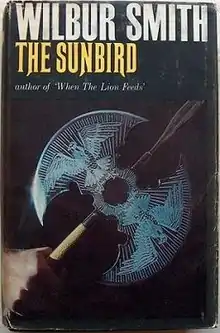The Sunbird
The Sunbird is a 1972 novel by Wilbur Smith about an archeological dig.[1][2]
 First edition | |
| Author | Wilbur Smith |
|---|---|
| Country | South Africa |
| Language | English |
| Publisher | Heinemann |
Publication date | 1972 |
The novel was a favourite of Smith's, who claimed it was heavily influenced by H. Rider Haggard.[3] Smith:
It was a very important book for me in my development as a writer because at that stage I was starting to become enchanted by the lure of Hollywood. There had been some movies made of my books and I thought "whoa, what a way to go… All that money!" and I thought "hold on – am I a scriptwriter or am I a real writer?" Writing a book that could never be filmed was my declaration of independence. I made it so diffuse, with different ages and brought characters back as different entities. It was a complex book, it gave me a great deal of pleasure but that was the inspiration – to break free.[4]
Smith later named his home "Sunbird Hill".[5] He also named his private trust,the Sunbird Trust.[6]
Plot
An archeologist discovers the ancient Phoenician city of Opet.
Reception
Academic Martin Hall has criticized The Sunbird for an alleged inherent stance against African nationalism and implicit defense of white rule in southern Africa.[7]
Another academic wrote that the book " is the most complete fictional exploration of an exotic Great Zimbabwe since Benita. It confirms that as the prospect of war loomed, white Rhodesians felt the same insecurity as they had in 1890s; and, as they had done in the 1890s, they turned to the ruined city for inspiration. Wilbur Smith, who was born in Zambia and briefly lived in Rhodesia, identifies with their vulnerability."[8]
Adaptation
Film rights to the book were bought by Michael Klinger who filmed two other Smith novels. However, as of 2019 no film has resulted.[9]
Progressive death metal/rock band Opeth took its name from the word "Opet", which in the novel is the name of a fictional Phoenician city in South Africa and whose name is translated as "City of the Moon".
References
- The Sunbird at Wilbur Smith's page
- "THE RUINS IN ZIMBABWE". The Canberra Times. 3 March 1973. p. 11. Retrieved 5 December 2015 – via National Library of Australia.
- Interview with Wilbur Smith accessed 14 March 2013
- "Wilbur Smith answers your questions", BBC News, 6 April 2009 accessed 14 March 2013
- "The secluded life that inspires best-sellers". The Australian Women's Weekly. 7 April 1982. p. 58. Retrieved 5 December 2015 – via National Library of Australia.
- Novelist is accused of assuming secret lives to conceal his assets: [FOREIGN Edition] Karen MacGregor in Johannesburg. The Independent; 9 Feb 2002: 5.
- Martin Hall, "The Legend of the Lost City; Or, the Man with Golden Balls". Journal of Southern African Studies, Vol. 21, No. 2 (Jun., 1995), pp. 179-199.
- Great Zimbabwe in Rhodesian Fiction Chennells, Anthony. Matatu; Leiden Iss. 34, (2007): 1-24,241.
- Andrew Spicer, Rethinking Authorship in Film: The Struggle for Creative Control between Michael Klinger (Producer) and Wilbur Smith (Writer)
External links
- The Sunbird at Kirkus
- The Sunbird at Wilbur Smith Books
